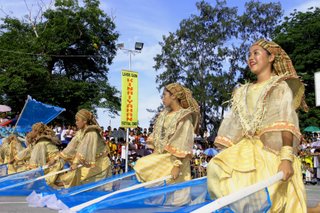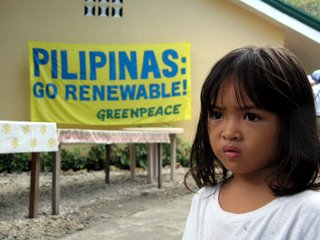HOPE FOR THE FUTURE OF CORAL REEFS
Tuesday, November 07, 2006
Greenpeace recently visited the municipality of Dauin and Apo Island as part of the Defending Our Oceans Tour. Highlighting the role of Marine Reserves in ensuring that our oceans remain a
 sustainable resource, the Apo Island Protected Landscape and Seascape has been the model of community-based coastal resource management since the early 1980s.
sustainable resource, the Apo Island Protected Landscape and Seascape has been the model of community-based coastal resource management since the early 1980s.However, Apo Island has not always been a good example of coastal management. Years ago, illegal and destructive fishingpractises were rampant on the island such as the use of dynamite and cyanide as well as muro-ami. It was only when the Silliman University, under the leadership of Dr. Angel Alcala, stepped in and convinced the members of the community that the destruction of their coral reefs is their own loss.
 The protection and management of Apo Island's coral reefs can be attributed to the strong community participation in implementing the project wherein both benefits and responsibilities are shared by the people living on the island. Aside from deputised fish wardens and the local officials, almost everyone on Apo Island is steadfast in guarding their valuable coastal resources. In fact, even children report any unknown vessel that they observe fishing or doing other activities in the surrounding waters of the island.
The protection and management of Apo Island's coral reefs can be attributed to the strong community participation in implementing the project wherein both benefits and responsibilities are shared by the people living on the island. Aside from deputised fish wardens and the local officials, almost everyone on Apo Island is steadfast in guarding their valuable coastal resources. In fact, even children report any unknown vessel that they observe fishing or doing other activities in the surrounding waters of the island.At present, Apo Island is considered the centre for learning of a well-managed marine reserve
 and has hosted countless study tours from all over the Philippines as well as from other countries. Revenues from the park fees are also used to sustain the management and protection of the marine reserve as well as several projects for the community of Apo Island. The municipality of Dauin, through the leadership of the current Mayor Rodrigo Alanano has replicated the experiences from Apo through the establishment of nine (9) marine reserves on the municipality’s coastline. Revenues from these marine reserves alone has contributed greatly to the municipality’s income, around P2 million in 2005, not to mention the benefits of increased fish catch that directly benefits the local fishing communities in Dauin and the rest of the province of Oriental Negros. Aside from these concrete efforts to invest in coastal management, the town also celebrates the Kinaiyahan (Nature) Festival every September 7 as part of the town fiesta featuring presentations centred on the rich cultural heritage of Negros that is anchored on nature.
and has hosted countless study tours from all over the Philippines as well as from other countries. Revenues from the park fees are also used to sustain the management and protection of the marine reserve as well as several projects for the community of Apo Island. The municipality of Dauin, through the leadership of the current Mayor Rodrigo Alanano has replicated the experiences from Apo through the establishment of nine (9) marine reserves on the municipality’s coastline. Revenues from these marine reserves alone has contributed greatly to the municipality’s income, around P2 million in 2005, not to mention the benefits of increased fish catch that directly benefits the local fishing communities in Dauin and the rest of the province of Oriental Negros. Aside from these concrete efforts to invest in coastal management, the town also celebrates the Kinaiyahan (Nature) Festival every September 7 as part of the town fiesta featuring presentations centred on the rich cultural heritage of Negros that is anchored on nature.

Greenpeace returned again to Apo in October to fulfil its promise to help in providing clean and renewable electricity. I was honoured to return and continue what was started during the Defending Our Oceans Tour when we conducted a feasibility study with the assistance of Barangay Captain Mario Pascobello. This time, under the Climate and Energy Campaign led by Abi, a solar energy system was installed on October 19 at the Apo Island
 Elementary School library. We were also joined by our fellow staff Beng, together with star power supporters Angel Aquino and Juddha Paolo.
Elementary School library. We were also joined by our fellow staff Beng, together with star power supporters Angel Aquino and Juddha Paolo.Mayor Rodrigo Alanano mentioned during the turn over ceremony that Apo Island’s future does not only rest on its well-managed marine resources but also to have 100% renewable energy by 2010. Coral reefs are very fragile ecosystems and, like the rest of the Earth's ecosystems, are threatened by climate change.
We left knowing that the solar energy installation is a catalyst to add to Apo Island's journey towards a sustainable future. Stay tuned!

posted by Danny @ 10:47 AM,
![]()
![]()
9 Comments:
- At 11:37 AM, said...
-
madonna has a song called holiday which may no longer be relevant considering summer and other seasons seem to be changing too quickly. nice pics! if we werent so bad every day would feel like a holiday if someone were in those waters daily...
prince - At 7:18 AM, Danny said...
-
thanks anonymous... or is it red?
:) - At 4:37 PM, Danny said...
-
and madonna also has a song entitled rain from the 90s:
"Rain, feel it on my finger tips
Hear it on my window pane
Your love's coming down like
Rain, wash away my sorrow
Take away my pain
Your love's coming down like rain" - At 5:13 PM, said...
-
that song is hundred years ago haha. what if is acid rain? what love like?
mazengo - At 5:35 PM, Danny said...
-
hello mazengo,
what do you mean by what love like?
danny - At 11:16 PM, said...
-
madonna say love like rain but if is acid, what love like?
sorry. - At 11:11 AM, Danny said...
-
ah okay.. hmm... don't know what to say about that hehe
- At 7:43 PM, Redster said...
-
acid love?
red - At 10:28 PM, said...
-
APO get now down why it is not more prodecet.
And a bigger Risk coms up of shore mining more read in
http://blog.dive-philippinen.com/





